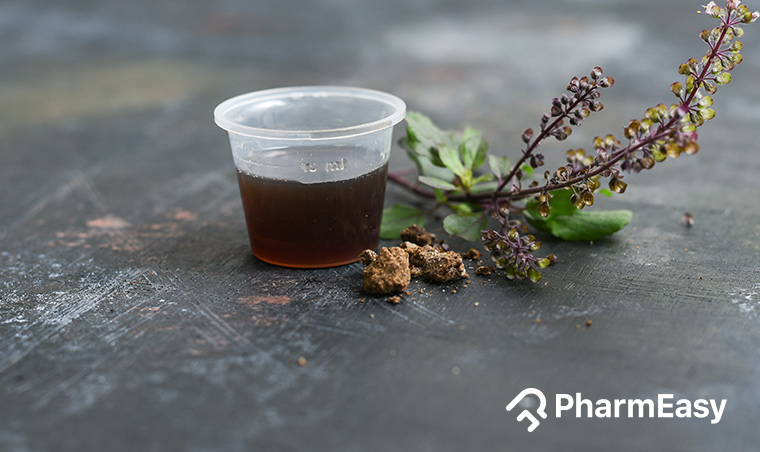Arjunarishta: Uses, Benefits, Side Effects & More!
By Dr Siddharth Gupta +2 more

Get,

to manage your symptom
Get your,


4 Cr+ families
benefitted

OTP sent to 9988776655



You’ve successfully subscribed to receive
doctor-approved tips on
Whatsapp

Get ready to feel your best.

Hi There,
Download the PharmEasy App now!!


Register to Avail the Offer
Send OTPBy continuing, you agree with our Privacy Policy and Terms and Conditions

Hi There,
Sign up on PharmEasy now!!
Trusted by 4 crore+ families

OTP sent to 9988776655



You have unlocked 25% off on medicines




Code: NU25

Comments


Leave your comment here
By Dr Siddharth Gupta +2 more
Table of Contents
Arjunarishta, also known as Parthadyarishta, is a hydroalcoholic formulation of the herb Terminalia arjuna belonging to the Combretaceae family1. It is consumed as a herbal decoction. Arjunarishta is made up of fresh stem bark of Arjuna (Terminalia arjuna), Madhuka (Madhuka indica), Draksha (Vitis vinifera), Dhataki (Woodfordia fruticosa), and Jaggery (Saccharum officinarum). Among these, Arjuna constitutes the highest proportion. It is formulated via a fermentation process that generates alcohol. This alcohol acts as a preservative as well as a solvent2.

Arjuna bark contains many phytochemicals, triterpenoids, glycosides, flavonoids, tannins, beta-sitosterol, minerals, and trace elements6.
Also Read: Dashmularishta: Uses, Benefits, Side Effects & More!
Various phytochemicals present in Arjunarishta may provide many health benefits. Phytochemicals like flavonoids, glycosides, phenolic acids, and triterpenoids possess antioxidant effects and free radical scavenging ability that can reduce inflammation.



However, more research is needed to understand their efficacy in treating cancer in humans.
Traditional uses of Arjunarishta are obtained mainly from its bark. The renowned ancient physician Chakradatta advised administering it as a bark decoction with milk or as a ghrita. It has been observed that consuming a decoction of bark might help in reducing headaches, earache and heart ailments. Dried bark powder mixed with rice water might help in reducing blood in the urine1.
Dr. Rajeev Singh, BAMS
As per the Ayurvedic Pharmacopoeia of India, Arjunarishta is to be taken after meals with water1. Dosage should be prescribed by an Ayurvedic physician based on individual health needs.
Also Read: Drumstick (Sahjan): Uses, Benefits, Side Effects and More!
Mentioned in ancient Indian medicinal texts like Charaka Samhita, Sushruta Samhita and Ashtanga Hridayam, Arjunarishta might hold ultimate medical value in managing cardiovascular diseases. Vagabhatta was the one who originally suggested using stem bark powder for heart conditions1.
Dr. Siddharth Gupta, B.A.M.S M.D (Ayu)
Also Read: Atibala: Benefits, Side Effects, Precautions & More
There is a lack of data regarding the interaction of Arjunarishta with other drugs. Therefore, patients are advised to talk to a doctor about its usage if they are already using any other medication or supplement.
Arjunarishta is a hydroalcoholic formulation of the herb Terminalia arjuna belonging to the Combretaceae family. Arjunarishta is composed of fresh stem bark of Arjuna, Madhuka (Madhuka indica), Draksha (Vitis vinifera), Dhataki (Woodfordia fruticosa) and Jaggery (Saccharum officinarum).
Arjunarishta contains many phytochemicals that act as antioxidants. Phytochemicals like flavonoids, glycosides, phenolic acids, and triterpenoids show antioxidant effects and free radical scavenging ability. Arjunarishta is used in hypertension. Other therapeutic uses of Arjunarishta are in lung disorders, heart diseases, azoospermia, loss of strength, and immunity.
Arjunarishta is known to contain alcohol, which is self-generated during the fermentation process.
There are no safety studies pertaining to its usage in children. Arjunarishta is known to contain alcohol, which is self-generated during the fermentation process. Thus, it should be used in children only after clear consultation with an Ayurvedic physician.
Arjunarishta is an Ayurvedic formulation made from the fresh stem bark of Arjuna (Terminalia arjuna), Madhuka (Madhuka indica), Draksha (Vitis vinifera), Dhataki (Woodfordia fruticosa), and Jaggery (Saccharum officinarum).
Consumption of arjuna is associated with mild side effects like body aches, headaches, gastritis, and nausea. Consuming arjuna plant extract, which is the key component of Arjunarishta, may lead to liver toxicity and hypothyroidism if consumed in excess without proper guidance.
Arujunarishta nourishes and strengthens the muscles of the heart. It promotes heart functioning by regulating blood cholesterol and blood pressure. The chief constituent of Arjunarishta, Arjuna, is beneficial in relieving angina pain, in the treatment of coronary heart disease and heart failure.
There are no safety studies pertaining to its usage in pregnant and breastfeeding women. Therefore, it should be used with the doctor’s advice and supervision.
There are no safety studies about its usage in pregnant and breastfeeding women. Therefore, it should be used with the doctor’s advice and supervision. There are no safety studies about its usage in children. Arjunarishta is known to contain alcohol, which is self-generated during the fermentation process.
Arujunarishta nourishes and strengthens the muscles of the heart. It promotes heart functioning by regulating blood cholesterol and blood pressure. The chief constituent of Arjunarishta, Arjuna is beneficial in relieving angina pain, in the treatment of coronary heart disease and heart failure.
Arjunarishta shows benefits in improving heart health, but it should not be used as a cure for any heart disease without consultation of a qualified doctor, or as an alternative to conventional medicines.
1. Dwivedi S, Chopra D. Revisiting Terminalia arjuna – An Ancient Cardiovascular Drug. Journal of traditional and complementary medicine [Internet]. 2014 Oct 1 [cited 2022 Feb 17];4(4):224–31. Available from: https://pubmed.ncbi.nlm.nih.gov/25379463/
2. Effect of Terminalia arjuna stem bark on antioxidant status in liver and kidney of alloxan diabetic rats – PubMed [Internet]. [cited 2022 Feb 17]. Available from: https://pubmed.ncbi.nlm.nih.gov/17051732/
3. Sivalokanathan S, Vijayababu MR, Balasubramanian MP. Effects of Terminalia arjuna bark extract on apoptosis of human hepatoma cell line HepG2. World J Gastroenterol. 2006 Feb 21;12(7):1018-24. doi:10.3748/wjg.v12.i7.1018. PMID: 16534840; PMCID: PMC4087891. Available from: https://www.ncbi.nlm.nih.gov/pmc/articles/PMC4087891/
4. Grace Nirmala J, Evangeline Celsia S, Swaminathan A, Narendhirakannan RT, Chatterjee S. Cytotoxicity and apoptotic cell death induced by Vitis vinifera peel and seed extracts in A431 skin cancer cells. Cytotechnology [Internet]. 2018 Apr 1 [cited 2022 Feb 22];70(2):537–54. Available from: https://pubmed.ncbi.nlm.nih.gov/28983752/
5. Shengule SA, Mishra S, Joshi K, Apte K, Patil D, Kale P, et al. Anti-hyperglycemic and anti-hyperlipidaemic effect of Arjunarishta in high-fat fed animals. J Ayurveda Integr Med. 2018 Jan-Mar;9(1):45-52. doi:10.1016/j.jaim.2017.07.004. PMID: 29249636; PMCID: PMC5884182. Available from: https://www.ncbi.nlm.nih.gov/pmc/articles/PMC5884182/
6. Amalraj A, Gopi S. Medicinal properties of Terminalia arjuna (Roxb.) Wight & Arn.: A review. J Tradit Complement Med. 2016 Mar 20;7(1):65-78. doi:10.1016/j.jtcme.2016.02.003. PMID: 28053890; PMCID: PMC5198828. Available from: https://www.ncbi.nlm.nih.gov/pmc/articles/PMC5198828/
Disclaimer: The information provided here is for educational/awareness purposes only and is not intended to be a substitute for medical treatment by a healthcare professional and should not be relied upon to diagnose or treat any medical condition. The reader should consult a registered medical practitioner to determine the appropriateness of the information before consuming any medication. PharmEasy does not provide any guarantee or warranty (express or implied) regarding the accuracy, adequacy, completeness, legality, reliability or usefulness of the information; and disclaims any liability arising thereof.
Comments

Leave your comment...

View all comments(1)
You may also like
Can we take arjunarist while having thyroid problem?